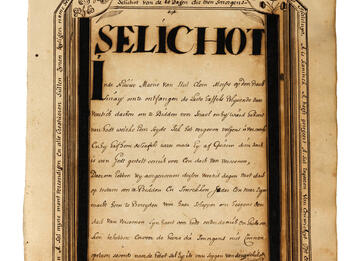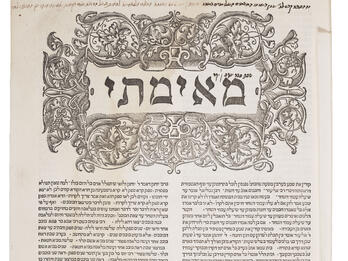Apology for His Language (On Yiddish and Hochdeutsch)
Copyist’s Preface
An apology for the fact that this is written in the language of Ashkenaz (in Hochdeutch [German]). In my opinion, there are two good reasons for this: first, I have found written in books of protocol that it is proper and correct for any matter of praise, especially such praise in honor of the exalted kingdom and empire, to be written (in good German) in the language of Ashkenaz. Furthermore, it serves to prevent any random person who does not understand the Hebrew language properly from coming forward and judging me unfavorably, in accordance with his weak and feeble understanding. Consequently, he will see it and be forced to admit that this is not a small matter; rather, he spoke well, speaking peace [see Esther 10:3], for the name of the good kingdom and the highest rule in the land; may God exalt his seed and the seed of his seed after him, for many generations, Amen.
The second reason is that some of the nations do not think or believe that there are those among the Israelite nation who know and understand their [German] language and speech. Now, even if the Jews do not speak like them or in their manner, this is not due to their lack of knowledge of the language. It is only because this entire nation is more accustomed to speaking otherwise, from their earliest studies of youth. This is one of their clear distinguishing signs, as the great difference between the Israelite nation and those other nations lies in their voice, speech, and appearance. The sages, of blessed memory, likewise stated in truth: Each person differs from the other in three ways: in voice, speech, [and appearance; see b. Sanhedrin 38a].
These comments are the forgotten sheaves [shikhe-ḥah] rather than the gleanings [leket] of my apology, so that I will be clear before the Lord and before Israel (Numbers 32:22), before you, the holy seed, blessed of the Lord (Isaiah 65:23), wise men, known to your tribes [see Deuteronomy 1:13], men of valor from all Israel, all of them beloved, all of them pure, ready to do the will of their Maker; these are the guardians of the city, who sit firm, watching over the entire city, the powerful and great, who make their enemies sink in the mighty waters (Exodus 15:10), the officers, providers and leaders, each and every one over his task of the holy services (Numbers 4:19). However, regarding the suspicion they have placed over me, when I am innocent—God forbid that I should believe such an idea about the chiefs and mainstays of our community, may the Merciful One guard and spare them—on account of certain printed writings of the uncircumcised some time ago, which have led to grievances and accusations from the masses against me, and unrelenting rumors that God forbid those things were done with my assistance and knowledge. God knows and faithful witness will testify about me up high that I am clear of any blame, blessed be the Lord.
I further state that if this matter, God forbid, is true, as the people gossip about me and reproach me, may there befall upon me, and my wife and children, all ninety-eight curses that are written in the Book [see Deuteronomy, ch. 28]. This text is also included—if there is anything uncircumcised here or any information about the dealings of my people, may all those curses befall me. However, if I am entirely blameless of all those accusations, may all those curses in the Book come upon them and their heads, their wives and children, as they are flatterers, informers, and tale bearers, who impart such ways to their children from when they are little, and they are called [meaning of words unclear] in the language of Ashkenaz. If you do not believe me, may it be God’s will that those who judge me will reach my place, as our sages of blessed memory have said: do not judge your fellow until you have reached his place [see m. Avot 2:4]. And if you do not believe in the message of the first sign, and you would rather believe the message of the second sign, our sages of blessed memory also said elsewhere: the flatterers, the slanderers, and those who suspect the innocent will not leave His presence blameless [see b. Sotah 42a], and a flatterer shall not come before Him (Job 13:16). This is my constant prayer, evening, morning, and noon (Psalms 55:18), that they who hate me may see it and be put to shame, because You, Lord, have helped me and comforted me (Psalms 86:17). These are true comforts, especially as I am like a slave in my poverty and lowliness with which I have struggled these ten years. Then there was the burning of our community, for our many sins, in which I too was caught up with my wife and children, and we left here with nothing. We subsequently had to deal with one upheaval after another for these last five or six years, to this day, all of us, while nobody pays attention to us or bestows any kindness upon us. On the contrary, a few of them do the opposite, and a hint is enough for the wise.
Therefore, my beloved rabbis, I did not come here to ask for anything, God forbid, but just to say that the grievance against me is without cause, and such a thing should not be seen or heard, as it is untrue. May heaven have mercy upon us, and may God remember us for good and think of us for a blessing, and save us for life, but only for eternal life, as it is better for me to die a slave than to live, for vain is the help of man (Psalms 60:13).
The words of the persecuted, lowly among men, and smallest of the smallest of Israel, Leib Rofe’ [physician] Wallach, from Frankfurt am Main.
Credits
Lów Wallach, “Hitnatslut (Apology for His Language: On Yiddish and Hochdeutsch),” in Jüdisches Franckfurter und Prager Freuden-Fest, by Johann Jacob Schudt (Franckfurt am Mayn: Matthias Andreae, 1716), 32–34.
Published in: The Posen Library of Jewish Culture and Civilization, vol. 5.






